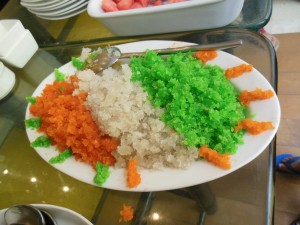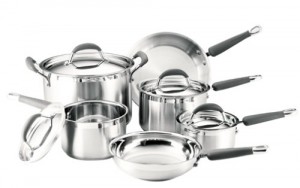The Cookware HeadQuarters
Best Cookware Reviews and Consumer Guide
Saving Money While On Vacation
I love eating out often but I admit, when I travel for weeks, eating out every day makes me miss home cooked meals. Also dining out while traveling can add up to your travel budget quickly, specially if you love wine, dessert like me. Here are some ideas on how to save money, sanity and your health while on vacation.
By Trent Hamm
Over the next two months, our family is going to be doing some vacationing in various places in the Midwest and Great Plains. The longest trip in that period will be nine days spent in South Dakota and Wyoming with my wife, my children, and my parents.
Vacations can be a lot of fun, but they can also be really expensive, and one of the biggest travel expenses is food. When you’re traveling, not only do you not have access to your own kitchen, you’re also often tempted to just eat at a restaurant when you’re near one while out and about visiting sites.
That can seriously add up. If we were to eat out and spend even just an average of $10 a meal per adult and $5 a meal per child, our trip to South Dakota and Wyoming would set our family back $1,485 just for food alone! That actually exceeds our lodging for the trip, believe it or not.
At the same time, eating out at an unusual restaurant in a town you’ve never been to before and may never be in again can be quite fun. To us, that’s a part of a family vacation.
So, what can we do to cut down on those costs without removing the fun? Here are some of the tactics we’ve built up over the years.
Take along some food for the first leg of the trip. The night before we leave, we’ll actually pack a bunch of food for breakfast and lunch the next day. Fresh fruit, sandwiches, vegetables, water bottles, and other such things can easily be packed up in advance and kept cool with ice.
Then, we just stop at a state park or something near lunchtime and eat a picnic lunch. It gives the children a great opportunity to run around and wear themselves out, which usually causes them to nap most of the afternoon (enabling much easier travel for a while).
Visit a grocery store upon arrival. Pick up things like breads, cold cuts, fruits, cereals, and other such simple fare. Fill up your refrigerator (in your hotel room or cabin) or your cooler with the stuff that needs to remain cool.
Each day, prepare a simple breakfast of fruit and cereal from what you have on hand and pack a lunch with those materials, too. Pack the lunch along with you and eat it on that day’s excursion.
Use the peak-end rule for evening dining. Pick two evenings during the trip in which you’ll eat out at a very nice restaurant. I suggest an evening fairly early in the trip for one such nice meal and the final evening of the trip for another nice meal.
For the other evening meals, eat at a low-cost place for dinner or, if you have a cabin or are camping, simply prepare a meal of your own at those spots.
The “peak-end rule” is a psychological phenomenon in which we judge our experiences almost entirely on how they were at their peak (pleasant or unpleasant) and how they ended. For example, if you have a family reunion that was largely pleasant except for one big argument in the middle and a big argument at the end (I have been part of such reunions), you’ll view the whole reunion as pretty unpleasant in retrospect.
Similarly, I’ve found that if you plan a vacation with one amazing event in the middle and a pretty good event to close the vacation, you’ll remember the vacation as being incredible, even if most of the days weren’t stuffed with excitement.
The same goes for dining. If you visit a town and eat two really great meals there, one at the end of your visit, you’ll come to think of the food as incredible on the whole and you’ll look back with pleasure. The rest of the meals are far less vivid in retrospect, so make them inexpensive and simple.
Keep hydrated and keep snacks on hand. If you end a vacation activity and find yourself really hungry and thirsty, you’re going to find it much easier to talk yourself into eating out somewhere expensive without making a good, rational decision about it. If you keep some snacks on hand, though, and everyone has access to water bottles, you won’t have your choices driven by the base impulses of hunger and thirst and won’t make a rash decision.
Choosing and executing a few simple frugal food tactics can turn a rather expensive vacation into an affordable one without taking away from the experience or the memories.
You might be interested in;
Article Written By Trent Hamm of Simple Dollar.Com
Image source: Cookware HeadQuarters

